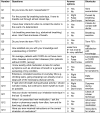Association of Patients' Knowledge on the Disease and Its Management with Indicators of Disease Severity and Individual Characteristics in Patients with Chronic Obstructive Pulmonary Disease (COPD): Results from COSYCONET 2
- PMID: 39650575
- PMCID: PMC11624521
- DOI: 10.2147/PPA.S488165
Association of Patients' Knowledge on the Disease and Its Management with Indicators of Disease Severity and Individual Characteristics in Patients with Chronic Obstructive Pulmonary Disease (COPD): Results from COSYCONET 2
Abstract
Background: In patients with chronic diseases, including those with chronic obstructive pulmonary disease (COPD), knowledge on the disease and its self-management is considered as relevant for improving disease control and long-term outcome. We studied to which extent components of knowledge depended on potential predictors, such as participation in educational programs and disease severity. For example, the perception of exacerbations or GOLD grade might modulate the content and reliability of COPD understanding.
Methods: Data from the German COSYCONET 2 COPD cohort was used, and 13 questions addressing knowledge and self-management were analyzed.
Results: Overall, 310 patients with the diagnosis of COPD of GOLD grades 1/2/3/4 as well as the former grade 0 were included (39.7% female, median age 66.0 years). The answers to 3 questions (knowledge of term exacerbation, pursed lip breathing technique, criteria for contacting a doctor) were improved (p < 0.05 each) when patients had had moderate-to-severe exacerbations, and to one question (breathing exercise) when having COPD grade 3/4 versus 0/1/2. The other 9 responses did not depend on disease severity, but most of the knowledge was improved when having participated in an educational COPD program. This was particularly true for knowledge that also depended on exacerbations, or if the treating physician was a pulmonary specialist. In some responses, the proportion of correct answers was significantly reduced in males compared to females. The dependence on education level, existence of a treatment plan, self-reported level of risk aversion and low depression score was weak and heterogeneous.
Conclusion: These findings suggest that part of the disease-related knowledge in patients with COPD was reinforced by the experience of exacerbations, especially knowledge regarding criteria on contacting a physician. These observations might help in focusing education on those parts of knowledge that are considered as important by patients based on their own experience.
Keywords: COPD; education; knowledge; patient acuity; symptom exacerbation.
© 2024 Fischer et al.
Conflict of interest statement
Prof. Dr Claus Vogelmeier reports grants, personal fees from AstraZeneca, CSL Behring, Boehringer Ingelheim, Chiesi, GlaxoSmithKline, Grifols, Novartis, Sanofi; personal fees from Aerogen; Insmed, Menarini, Roche, outside the submitted work. Prof. Dr Robert Bals reports grants from German Federal Ministry of Education and Research (BMBF) Competence Network Asthma and COPD (ASCONET), during the conduct of the study; grants, personal fees from AstraZeneca GSK CSL; Regeneron, outside the submitted work. Prof. Dr Winfried Randerath reports personal fees from Boehringer Ingelheim, Novartis, Berlin Chemie, GlaxoSmithKline, outside the submitted work. Prof. Dr Kathrin Kahnert reports personal fees from Boehringer Ingelheim, Astra zeneca, GSK, Chiesie, Insmed, outside the submitted work. Prof. Dr Werner Seeger reports personal fees from United Therapeutics, Tiakis Biotech AG, Liquidia, Pieris Pharmaceuticals, Abivax, Pfizer, outside the submitted work. Dr Stefan Kuhnert reports personal fees from Sanofi, AstraZeneca, GSK, outside the submitted work. The authors report no other conflicts of interest in this work.
Figures



References
-
- Agusti A, Vogelmeier CF. Global strategy for the diagnosis, management, and prevention of COPD. Available from: https://goldcopd.org. Accessed November 23, 2024.
-
- El Asmar ML, Dharmayat KI, Vallejo-Vaz AJ, Irwin R, Mastellos N. Effect of computerised, knowledge-based, clinical decision support systems on patient-reported and clinical outcomes of patients with chronic disease managed in primary care settings: a systematic review. BMJ Open. 2021;11(12):e054659. doi: 10.1136/bmjopen-2021-054659 - DOI - PMC - PubMed
LinkOut - more resources
Full Text Sources

